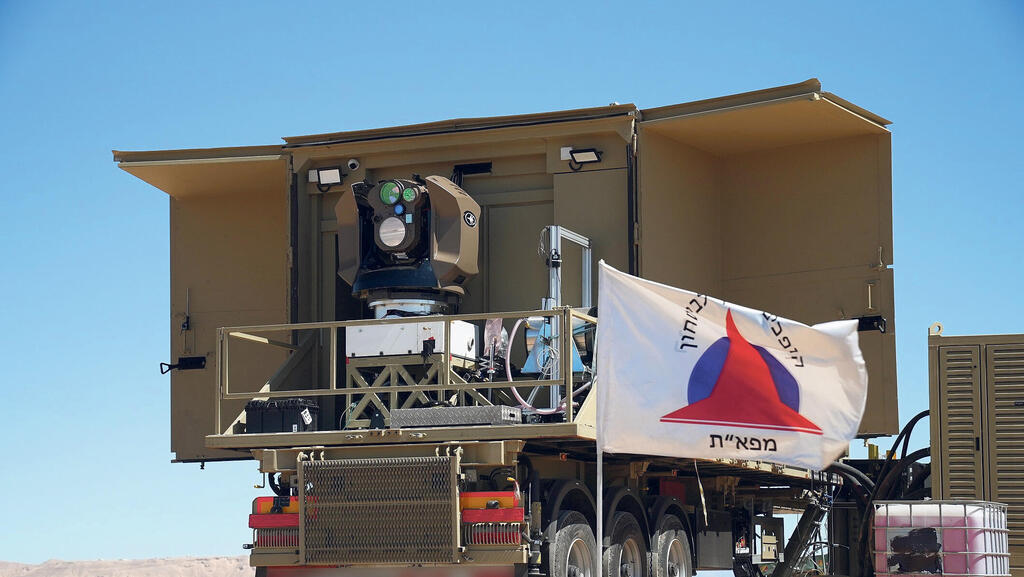
Laser beams and battlefield proof: Israeli arms firms sell their war story in Paris
Despite war with Iran and political pressure in Europe, Israeli defense firms arrive at the world’s biggest arms expo with real-world credibility.
Against the backdrop of the war with Iran, its missile barrages on Israel’s home front, and the closure of Ben Gurion Airport, Israeli defense companies are altering the format of their participation in the Paris Air Show, which opens on Monday. This decision comes after most of them had already completed preparations for the prestigious defense exhibition, including the shipment of advanced weapons systems and equipment to be displayed at the Israeli pavilions on the fairgrounds.
Among the Israeli companies set to exhibit are the “big three”, Rafael, Israel Aerospace Industries (IAI), and Elbit Systems, along with medium-sized and small firms also targeting global defense markets. Over the weekend, some companies held situation assessments and decided to base their participation on marketing and sales staff employed by their international subsidiaries, whose travel to France is not expected to face any restrictions.
The Paris Air Show is considered the world’s most prestigious defense exhibition, where every ambitious and competitive company seeks to make an impact. Last year, French President Emmanuel Macron barred Israeli participation in two major arms fairs in an attempt to pressure Israel to halt the war in Gaza. That political stance incidentally benefited French defense firms by removing Israeli competitors from the international stage, particularly at a time when global demand for advanced weaponry is surging.
“The issue is only growing in light of recent events”
In recent days, senior Israeli security officials have not ruled out the possibility that Macron may once again try to block Israeli participation, this time at the last minute. Even if no formal ban is imposed, the exhibition is expected to be accompanied by widespread protests and demonstrations from pro-Palestinian and BDS activists targeting Israeli companies due to the ongoing war in Gaza and the resulting civilian toll.
“Each company is making its own decisions independently. Those unable to send full delegations due to the closure of Ben Gurion Airport are working to maximize the activity of their overseas representatives. Our exhibits have already arrived, construction of the Israeli pavilions is in full swing, and despite the situation and tremendous logistical challenges, there will be an Israeli presence at this important event,” a senior defense industry official told Calcalist.
Alongside the major companies building high-profile pavilions, the Defense Exports Control Agency (DECA) at the Ministry of Defense will open its own booth to showcase innovations from smaller defense-tech firms and startups.
Related articles:
“The world is astonished by Israel’s capabilities, which enabled precision strikes deep inside Iran. These capabilities were provided by all defense industries without exception,” another senior defense official told Calcalist. “At every major defense exhibition, Israeli technologies generate intense interest from foreign military delegations, and following recent events, that interest will likely be even stronger this week in France.”
Almost two days into the war with Iran, the Israeli Air Force highlighted the success of its first attack waves, which enabled safe air corridors for fighter jets en route to Tehran. But beyond that specific operation, after more than 20 months of a multi-front war with Hamas in Gaza, Hezbollah in Lebanon, the Houthis in Yemen, and Iranian-backed militias across the region, Israel’s defense industries have no shortage of combat-proven systems to offer the global market, where militaries are upgrading their arsenals at a rapid pace.
These militaries are expanding their defense budgets in response to fast-moving geopolitical developments, from the ongoing war in Ukraine to the regional conflict in the Middle East and a brief but intense border flare-up last month between India and Pakistan, showcasing the escalating risks even between nuclear-armed nations.
From Iron Dome to Iron Beam
In addition to its flagship air defense systems - Iron Dome, David’s Sling, and Arrow 3 - which have operated nonstop since October 7 to intercept missiles, rockets, and drones, Rafael plans to unveil the Iron Beam system for the first time at an international event. Iron Beam is a high-powered laser defense platform capable of intercepting rockets, drones, mortar shells, and other projectiles at a fraction of the cost of traditional interceptors.
In recent weeks, Israel’s defense establishment disclosed that Iron Beam underwent successful operational testing during the war with Hezbollah, intercepting dozens of explosive drones launched from Lebanon. Rafael also plans to showcase two additional mobile laser-based systems with lower energy output than Iron Beam but designed to support ground forces with close-range protection against mortars, UAVs, and similar threats.
Although the October 7 attack caught Israel by surprise, the Air Force has since achieved notable operational success across multiple combat theaters, successes that foreign militaries have taken note of as they rethink their force readiness and procurement strategies.
A significant share of those achievements stems from years of defense industry innovation, developing end-to-end systems tailored to the IDF’s operational needs. Now, as these companies turn toward the international market, they are offering cutting-edge, battle-tested systems with proven effectiveness, and preparing for deals that could generate record revenue during what is already the most commercially successful period in their history.














